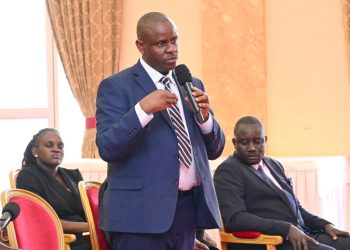President Yoweri Museveni has held bilateral talks with the American deputy secretary for East Africa, James Makila. During the meeting at State House Entebbe on Tuesday, the President and his guests discussed how Uganda and the US can work together to increase and promote investment and infrastructure development in Uganda.
Philemon Mateke, the state minister for regional affairs, US Ambassador to Uganda Deborah Malac and Kim Harrington, the head of political and economic sector at the US mission to Uganda, attended the meeting. While interacting with the President, Makila said Uganda had a lot of opportunities that the US would be interested in partnering in such as security and health, particularly fighting the Ebola pandemic, among others.
“We want to work with countries that have a vision for Africa’s growth and understand what is needed for American companies to invest. We want Uganda to be less dependent on foreign aid,” she said.
In October this year, American President Donald Trump signed a $60b (about sh222 trillion) Better Utilisation of Investment Leading to Development (BUILD) Act to promote American corporate investment in Africa. During the talks, President Museveni said the Government was already dealing with bottlenecks such as the high cost of transport and electricity so as to attract more investors into the country that would in return help to address issues such as youth unemployment.
“It is important for the State to address some issues such as the cost of electricity, transport and cost of capital so that the cost of production is low. Once we deal with those, more investors will be attracted to invest in Uganda,” he said.
President Museveni called on the World Bank and the International Monetary Fund to promote private sector-led growth.
“Governance and rule of law are software parts of development, but there is need to address hardware issues such as the low cost of power and electricity. Software alone is not sustainable,” Museveni said.
The President and Makila also discussed regional issues mainly the security situation. Makila said the US was grateful for Uganda’s contribution towards the African Mission to Somalia (AMISOM).
“We are grateful for your contribution and value our security partnership,” she said.
President Museveni said there was need to build institutions, such as the army, so that Somalia would address the institutional vacuum. Makila also commended the President, his government and the people of Uganda for their hospitality towards refugees.
Uganda is now home to about one million refugees, more than half of them from South Sudan. Uganda ranks third globally after Turkey and Pakistan among countries hosting the largest number of refugees. Uganda is globally considered a model case in the handling of refugees.
The country’s refugee law grants them rights to documentation, social services, freedom of movement, work or business. The National Development Plan II provides for specific interventions to improve their livelihoods and create an enabling environment for refugees to live in safety, dignity and harmony.
A 2015 World Bank assessment found that over 78% of respondents in refugee settlements were engaged in agriculture. They are also granted access to all the social services enjoyed by their host communities. In 2016, Government also enacted a legal and policy framework that allows refugees to stay in urban centers if they so wish, thus facilitating the enjoyment of their human rights
































































